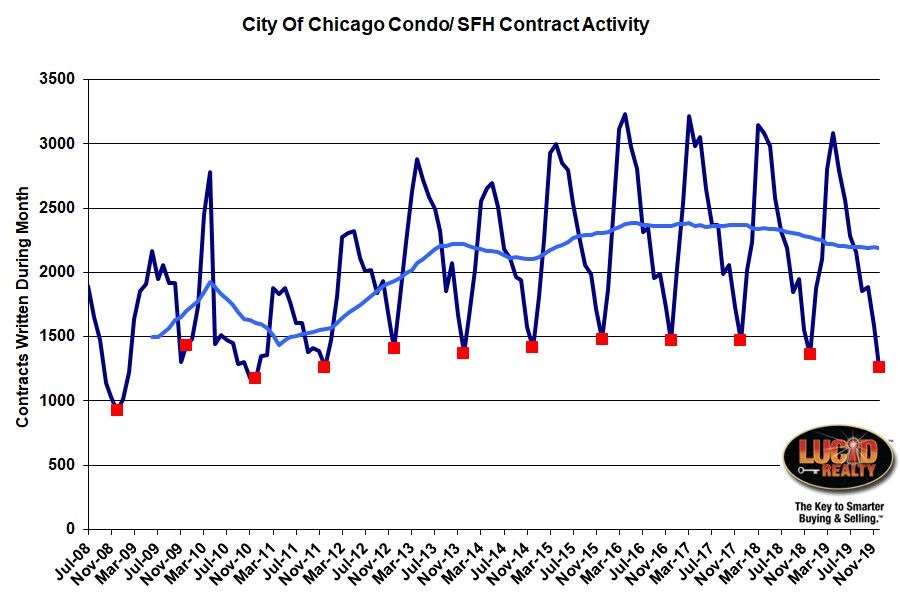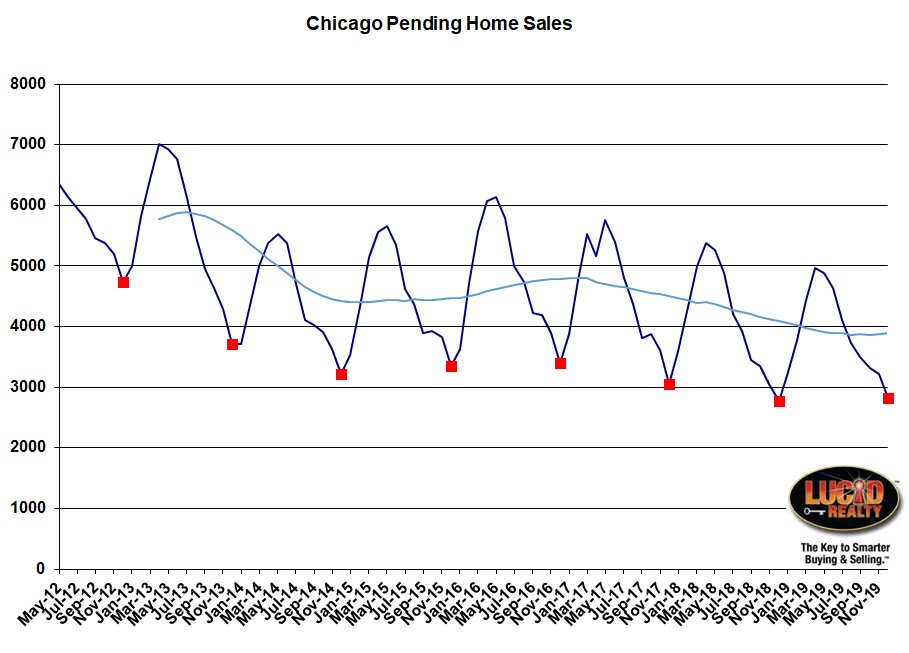First of all, December home sales in Chicago actually spiked 9.2% above last year and, technically, that is the biggest percentage gain in 33 months. But check out the graph below where I have all the monthly home sales going back to 1997 with all the Decembers flagged in red and a light blue moving average trend line. As you can see the previous December actually sucked pretty bad. It was down a whopping 15.4% from the year before that. So, if you throw out the 2018 number this would have been the worst month for the Chicago real estate market in 7 years. The overall trend in home sales remains down.
The Illinois Association of Realtors will be announcing their alternate truth on home sales in a couple of weeks. At that time they will most likely report an 8.6% increase in sales. I’m also guessing that they will position that as a possible turnaround in the market. They like to put a positive spin on things so as to encourage home buyers.

Chicago Home Contract Activity
If you’re a realtor and want to be further depressed about the Chicago real estate market check out home contract activity. December hit the lowest level in 9 years with a 7.2% decline from the previous year. That’s also the biggest decline in 9 months and the trend is unmistakably down. So it doesn’t bode well for future closings (sales).
But really, do declining home sales matter to anyone other than realtors who make their money off of transaction volume? What really matter to home buyers and sellers are a lot of the other metrics we follow. Read on.
Pending Home Sales
The number of homes under contract, waiting to close is another indicator of what future closings might look like. As you can see in the graph below there has been a general downward trend now for several years. That draw down has been supplementing closings since it probably occurs as a result of closings exceeding contracts written. To be fair, it can also occur as a result of more contracts falling apart but I monitor that and I don’t believe that rate has risen in this time frame.
December’s pending home sales actually increased slightly relative to last year – by 61 units. That’s a pretty small amount but what’s important here is that the increase in closings that we saw did not come at the expense of a draw down in pending home sales so it’s supported by the underlying contracts written.
Distressed Home Sales
Now this is a metric that everyone cares about since it’s an indicator of the overall health of the Chicago real estate market. Ever since the depths of the housing crash the percentage of home sales that are distressed has been declining. From a high of 58% we are now most likely sustainably below 10%. December hit a new low (for Decembers) of 5.8%, which is down from 9.1% the previous year. That’s a pretty big decline given that we’re running out of room to drop further. This is a good thing because nobody wants a bunch of distressed homes on the market. It makes everyone nervous, though it’s good for the opportunists.
Chicago Home Inventory
Another important indicator is the available inventory of homes for sale. Home sellers want this to be low and home buyers want it to be high. In Chicago inventory is kinda low still, although the inventory of attached homes has been rising for a few years now and has finally caught up to detached homes, which has been on the decline. Both now sit at a 3.1 month supply. That’s exactly where attached inventory was the previous December. However, that’s a steep decline for detached homes which had a 3.7 month supply the previous year. If everyone is leaving Chicago where is all the inventory of detached homes?
Chicago Home Sale Market Times
How long it takes to sell a home in Chicago should roughly track with inventory levels, with high inventory driving up market time. And home sellers and buyers are again at odds with each other. Guess which ones want it to be fast vs. slow. Hint: longer market times make sellers more desperate and therefore negotiable. Average market times for attached homes have been on the rise lately with December hitting 97 days, up from 88 days the previous year. And, although the market times for detached homes had been on the decline, they also shot up to 97 days in December. But that was a larger percentage increase than for attached homes since a year earlier it was only 83 days.
Check out our Web site for additional statistics and analysis on the Chicago real estate market.
#ChicagoRealEstate #RealEstate
Gary Lucido is the President of Lucid Realty, the Chicago area’s full service real estate brokerage that offers home buyer rebates and discount commissions. If you want to keep up to date on the Chicago real estate market or get an insider’s view of the seamy underbelly of the real estate industry you can Subscribe to Getting Real by Email using the form below. Please be sure to verify your email address when you receive the verification notice.


